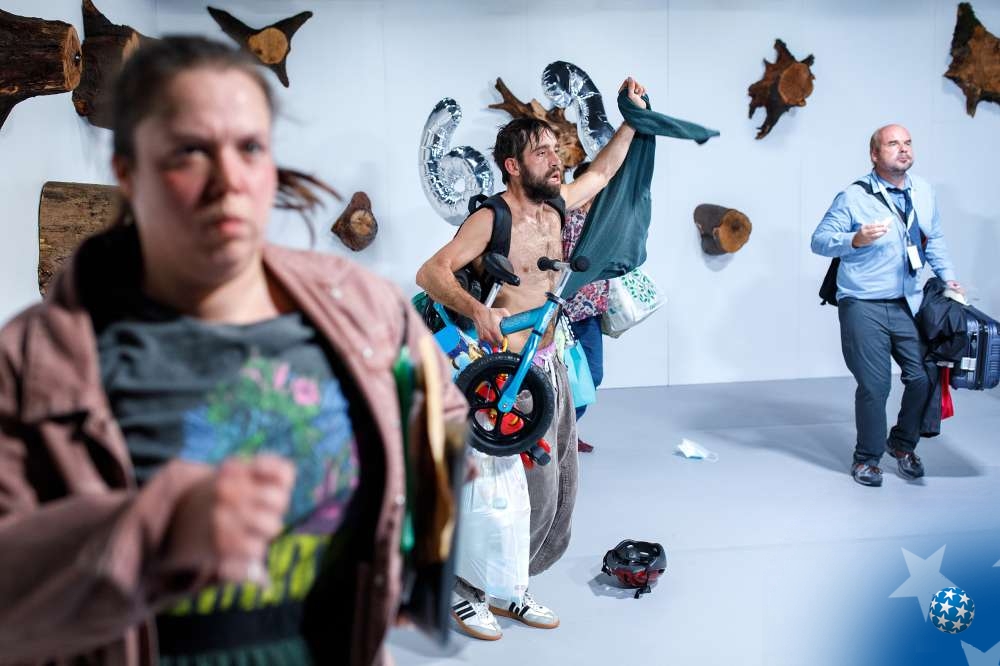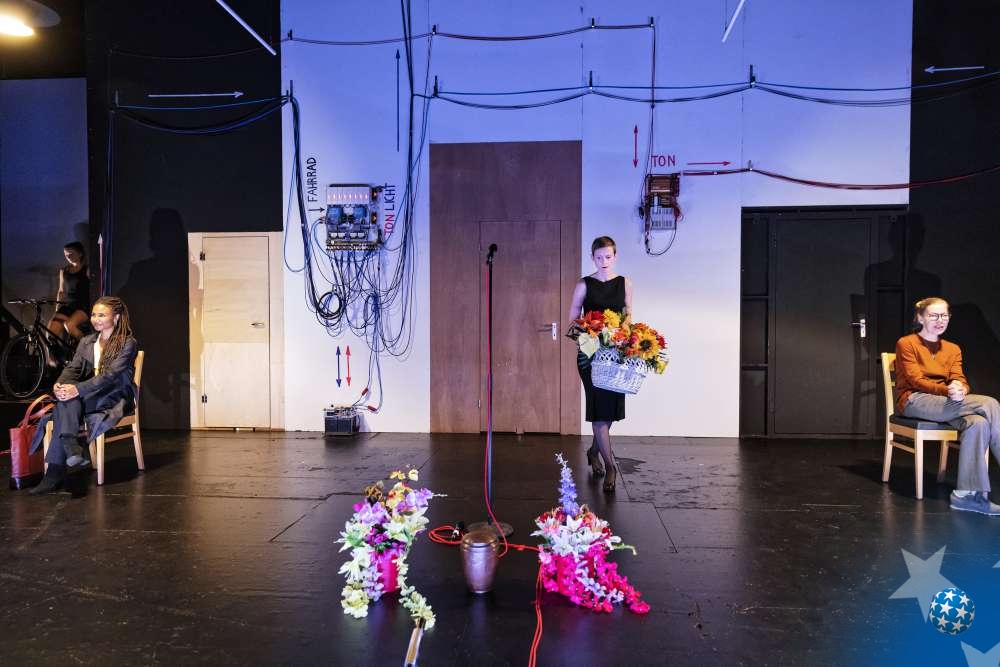- From personal to global ones, the term you’ve chosen as a title and the subject of the production Crises has a very broad meaning. What is it that connects every one of them, what is the essence and universality of each individual crisis, have you fathomed the answer to this question through working on this production?
Our starting point was the question of whether crisis nowadays still holds any potential for change or has it, because of its permanent presence in thousand shapes and forms, lost its impetus as a potential breaking point that puts a stop to the habitual flow of events and opens a space for something new. It seems to me that we are drowning in multiple shades of crises - personal, career related, interpersonal, existential, life… And in solving these crises, we somehow forget, or simply are not able, to tackle and resolve the greatest crisis humanity faces, the ecological crisis which is at its core inextricably linked to the predominant economic system - capitalism. Until we’ve addressed this fundamental problem, the issues of inequality and exploitation of everything that lives and exists on this planet, we won’t really solve any crisis, we’ll only grow tired bit by bit and give up sooner or later.
- What are your thoughts of the theme of this year’s Bitef and how do you address it in your show?
The current epoch, which, due to human intervention and changes in climate and ecosystem, we refer to as anthropocene, shouldn’t in fact be called anthropocene but capitalocene, because the ecological crisis is a direct consequence of the economic system based on exploitation and the imperative of constant growth. On a planet with limited resources, this inevitably clashes with one limitation or another, but instead of questioning or changing this bleak imperative, we only end up witnessing new, ever more innovative, and often more brutal, modes of exploitation. Most of us are condemned to a bizarre combination of consumerism and precarity, a very unfortunate combination with very destructive effects on the planet itself.
- Along with several other titles from this year’s selection, artistic director Ivan Medenica describes your production as devised theatre, very much corresponding to the theme of the 56th edition of Bitef through its practice of democratisation of the creative process. What did this co-creating process look like in the case of Crises?
The production was focused on the quotes from the books by Jason Hickel, Less is More: How Degrowth Will Save the World and Anna Lowenhaupt Tsing, The Mushroom at the End of the World. The devised principle does not entail arbitrariness or coincidence. Even though we had honed the material for the show gradually and together, it does not mean that it could look any differently or that it is a result of a series of incidental events. The devised principle ensures more engagement of all participants, and this is an extremely important, if not crucial, component of contemporary creativity. Willingness of this extraordinary group of actors to endure this physically extremely demanding performance is incredible and in every way imaginable surpasses the “official duty activities”, no one but a co-creator would be prepared to do such a thing.
- In this production you continue your interest in engaged, political theatre, and on one occasion you stated that you would like your shows to encourage increased political participation. Does this mean that you believe in the old adage of “theatre can change the world”?
I believe it’s necessary to make a clean break with the common flow of things. We need new sources of hope, but we also need fierce blows to the stomach to warn us of how we as a society will end up if we don’t change a thing. I believe change is a sum of multiple factors. The change will not arrive as a single grand gesture, but rather as a murmur of diversity.
- What is a contemporary spectator like, how much do you think they are ready for any sort of engagement in matters you address?
I don’t know. I believe us people are creatures hungry for meaning, and the time we live in does not offer a lot of meaning. However, we are constantly being persuaded that the path we follow is the only right one, the only possible one. I think it is reasonable and necessary for us to tackle doubts we all have, some people intuitively others in a more articulated manner. I think it is important to remove the fog that prevents a clear view of the state of things. We all probably wonder when we’ll get to that point and when we will say that enough is enough and demand change. With my productions, I’d like to create resistance and discontent with the fact that we as individuals are mere observers of the development of events around us, rather than active co-creators of the future.
- What exactly is the optimistic perspective in Crises, the very reason for which the performance was left to the end of the festival? Will you, at this moment in history, extraordinary on many grounds, really offer us a happy ending or a positive outlook on the future?
I think most people will not describe the production as optimistic, that’s not what it is, in a broader sense. It doesn’t shy away from the fact that we are destined for destruction, indeed it emphasises this, it speaks about survival always being a matter of collaboration. We currently still live in a culture portraying man as a selfish individual, competitive and guided by selfish interests, nature and natural processes are seen as a cruel fight of the enclosed ones, a fight for survival and continuation of species. But this is not the case, it’s not competition that’s at the core of our world, it’s collaboration. People cannot survive as such, we need other forms of life for normal functioning, the bacteria in our intestines, for instance. Where, then, is the border between individual life forms?
- The slogan of 56th Bitef is a line from a Yugoslav proletarian song, you are said to be a regional rising star director, and your productions tour the countries in the region. As a young man, what is your relation towards the notion of regional and do you think it can now have a meaning similar to that the word Yugoslav had back in the day?
I am very happy that collaboration within the region is taking place more and more frequently. Being enclosed within small countries and small environments is always very unhealthy, it creates strange distribution of power and some stuffy climates. I am convinced we need to be proud of our shared Yugoslav heritage and that we must continue to nurture it in our international, emancipatory and avant-garde spirit.
- At the end, let us cast another glance at the slogan and the theme of the festival. How do you feel as a worker, a theatre worker, who lives, works and creates in this socio-political moment, in a neoliberalcapitalist system and the world subjected to it?
Fear is omnipresent. Theatre direction is no longer experienced as creating a work of art, but rather as an audition for future engagements, the sense of being replaceable as an artist, that you’re disposable goods, is constantly present and encouraged. There’s an attempt to limit different creatives to a single mode of creation. Here too we see attempts at objectivisation and uniformity at work. In a nutshell, the same processes as in any other industry, the arts are no exception.

